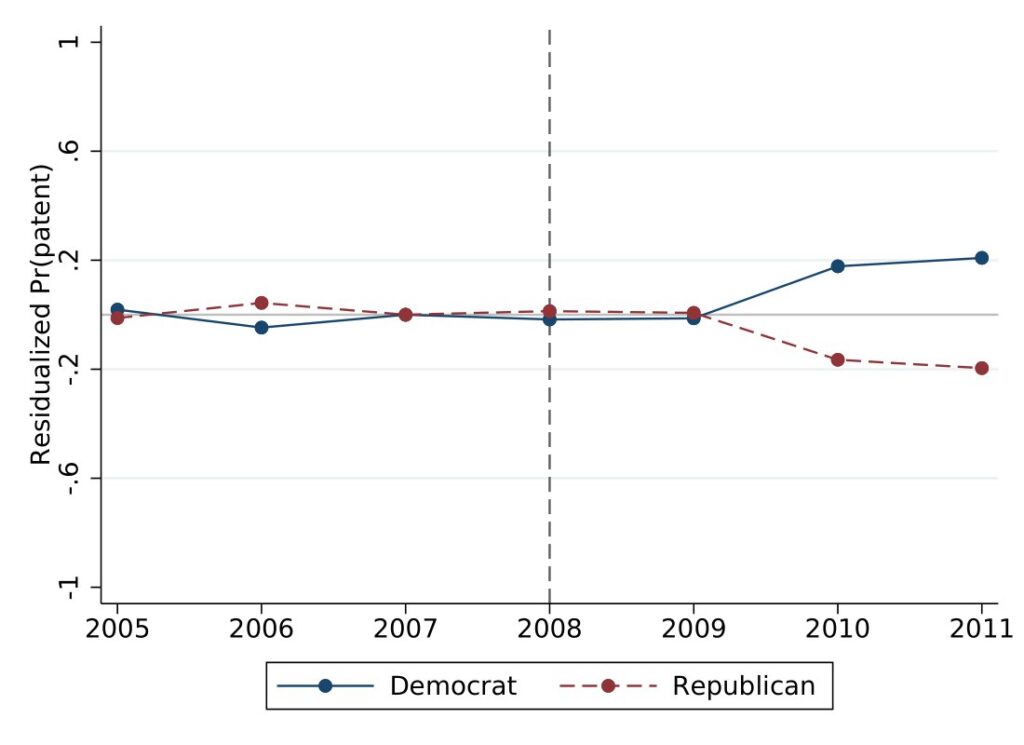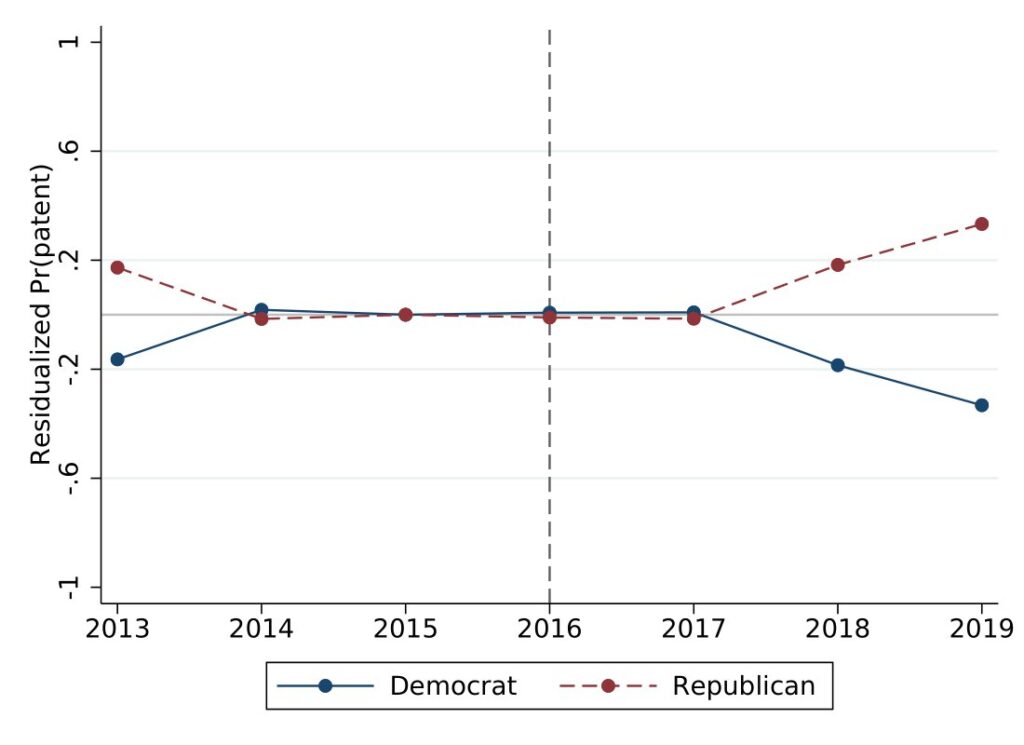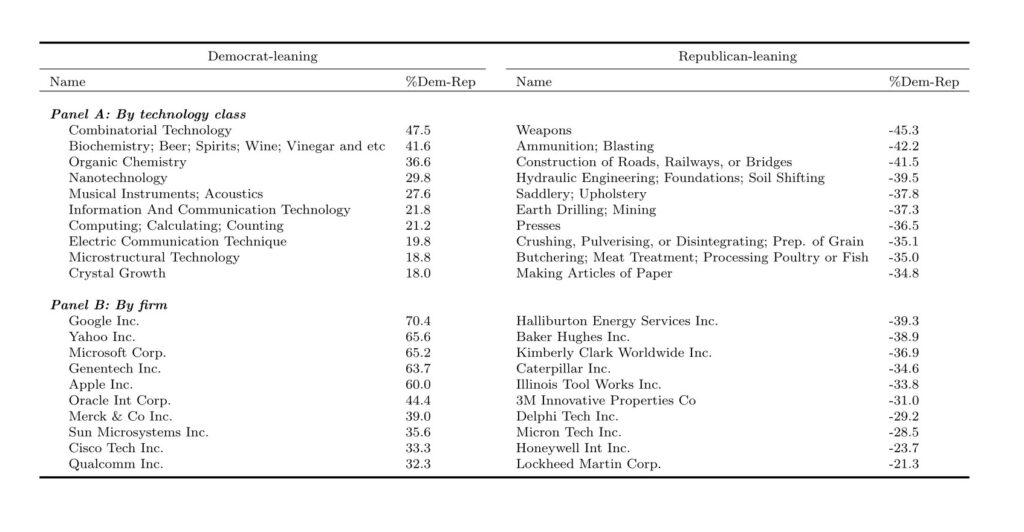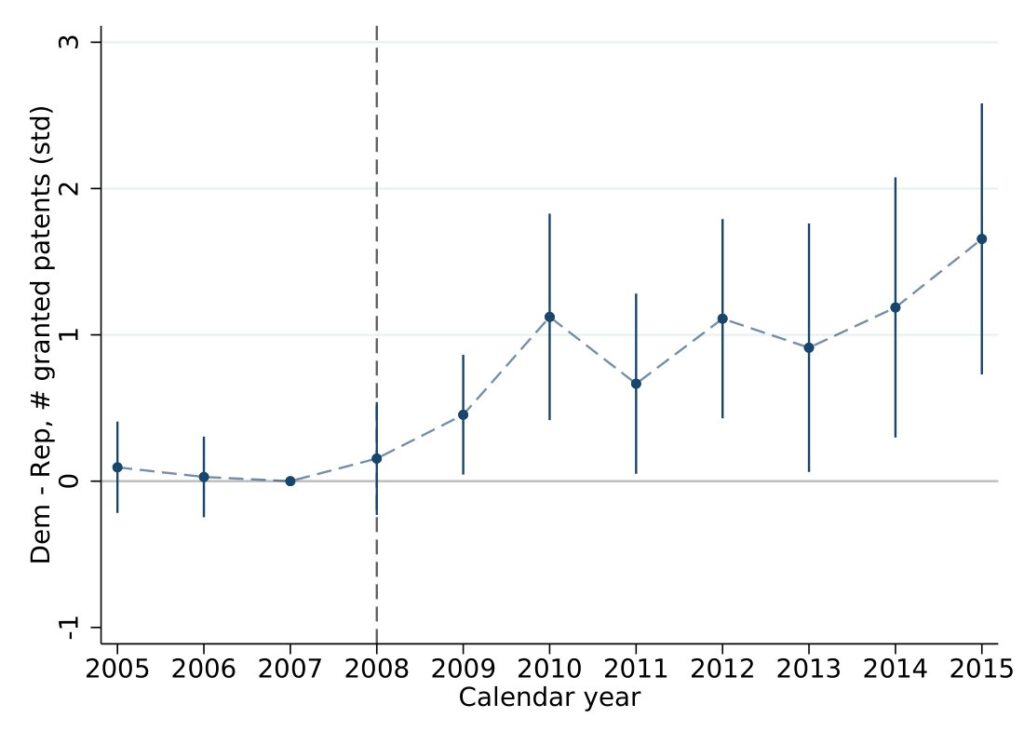Does an inventor’s political identification affect their productiveness? In a brand new paper, Joseph Engelberg, Runjing Lu, William Mullins, and Richard Townsend study the impacts of the 2008 and 2016 United States presidential elections on Democrat and Republican inventors, with a specific give attention to the amount and high quality of patents after the nation elects a brand new president.
United States presidential elections have became life-changing occasions. Voters whose most well-liked candidate misplaced the election report sharp decreases of their financial expectations and subjective well-being. For instance, Republicans went from being considerably much less optimistic concerning the economic system than Democrats instantly earlier than the 2016 election to considerably extra optimistic within the first quarter of 2017. This similar sample reversed across the 2020 election. Whereas social scientists usually analyze this shift in sentiments by means of the lens of public opinion polls or inventory market fluctuations, a much less explored however equally consequential dimension is how this political sea change impacts the American workforce.
In a latest research, we doc how these political tides affect employee productiveness, specializing in a crucial group—modern staff who produce patents. Technological progress is the engine of America’s long-term financial development. Accordingly, the significance of those inventors’ productiveness and their contributions to the economic system is just not merely a matter of particular person profession trajectories. We will measure modifications in inventors’ productiveness by what number of patents they undergo the U.S. Patent and Trademark Workplace. Our speculation is that modifications in financial optimism might have an effect on patenters’ productiveness as a result of those that anticipate a industrial growth resulting from their most well-liked candidate profitable an election will work tougher as a way to seize the excessive financial returns created by a robust economic system.
Our research focuses on two pivotal elections: the 2008 election that introduced Barack Obama to energy and the 2016 election that ushered within the Donald Trump period. Utilizing a database of 380,000 patenters merged with voter registration information, we assess the productiveness of Democratic and Republican inventors. The info present that inventors who determine with the profitable occasion utilized for extra patents after an election relative to these aligned with the dropping occasion. This divergence is just not fleeting; the hole in patenting exercise between the “profitable” and “dropping” inventors turns into more and more pronounced two years after the election and persists for as much as six years.
Determine 1: Residualized Chance of Submitting a Patent Utility Democrat vs. Republican Inventors


Determine 1 above plots the annual likelihood of submitting a patent software by political allegiance after eradicating yearly averages for patent functions by class of expertise. Previous to each elections, the trajectories for the 2 events are nearly indistinguishable. Publish-election, nonetheless, we observe a marked divergence. Once we use a difference-in-differences occasion research method to quantify the impact following the 2008 election, we discover that Democratic inventors’ annual probability of patenting is 2% of the imply greater than that of Republicans by 2011. In distinction, by the third yr after the 2016 election, as soon as they’re on the dropping facet, Democrats’ productiveness drops by 3.8% of the imply relative to Republicans.
Political activeness accentuates productiveness shifts
To sharpen the proof that it’s the political orientation of inventors that has a causal impact on productiveness, we study politically energetic inventors. Particularly, we use the voting and donation historical past of every inventor to determine an energetic partisan from a less-committed one. The instinct is simple: a regime-shift ought to have better results on people who’re extra invested in political elections. If this speculation is true, we must always see stronger results amongst politically energetic patenters.
This relationship is exactly what we discover. Defining politically energetic patenters as these with an above-median voting propensity in previous elections, we estimate that energetic Democrats’ annual likelihood of patenting is 4.3% of the imply greater than that for Republicans by 2011, whereas the likelihood for inactive Democrats is barely 0.8% greater. The 2016 election shows a mirror picture. Politically energetic Democratic patenters expertise a 4.7% decline in relative productiveness, whereas their inactive counterparts see a 3.5% drop. Utilizing knowledge on people’ historical past of political donations as a measure of political engagement yields equally constant outcomes.
Tech- and firm-level productiveness results
If sure applied sciences or corporations are closely skewed in direction of members of 1 occasion, there might be macroeconomic penalties ensuing from the individual-level results that we doc. For instance, if Republican inventors dominate patenting in fracking applied sciences they usually change into much less productive following Obama’s election in 2008, we’d count on fracking expertise to lag in its price of progress following 2008. Motivated by this conjecture, we study the extent of political segregation in our setting.
We discover proof of serious political segregation amongst patenters each throughout corporations and throughout technological areas. For instance, Republicans outnumber Democrats 3-to-1 in weapons patenting, however are outnumbered by Democrats 5-to-1 at Google. Desk 1 under exhibits political segregation for probably the most partisan expertise lessons and publicly listed corporations, as decided by the partisanship of their patenters. Furthermore, groups are crucial to data manufacturing, and we present the probability of mixed-party groups (i.e., groups containing each Democrats and Republicans) submitting patents fell by 14% from 2004 to 2019.
Desk 1: Occasion Focus of Patenters by Expertise and by Agency

Given the proof of technology- and firm-level political segregation amongst patenters, we’d count on partisan sentiment shocks to have an effect on sectoral technological progress extra broadly. To look at this, we research technology-level patenting patterns across the 2008 election. The info present that applied sciences dominated by Democrats achieve a discernible modern edge over their Republican-led counterparts post-election. Particularly, Democratic expertise subclasses have a normal deviation extra granted patents than Republican ones by 2010, a niche that widens to 1.5 commonplace deviations by 2015, as proven in Determine 2 under.
Determine 2: Political Mismatch and Variety of Granted Patents by Expertise Subclass

A pure concern is that the individual-level results we doc might be pushed by public coverage modifications on the geographic or business stage. For example, Trump’s election might have tilted insurance policies in favor of Republican-heavy sectors like oil and gasoline, whereas disfavoring Democrat-dominated sectors like renewable vitality. One can think about comparable coverage modifications focusing on political geographies. To deal with this concern, we study results inside slim geographic areas and inside sorts of expertise. Our conclusions are unchanged. We even evaluate Republicans and Democrats patenting on the similar agency in the identical expertise and proceed to seek out variations of their productiveness. In brief, we discover no proof that public insurance policies focusing on particular industries or geographies can clarify our outcomes.
As Individuals change into more and more partisan, there’s rising concern that workplaces could change into politically homogeneous. We discover a sample of accelerating political homogeneity amongst patenting groups, which in flip could have an effect on the speed of progress throughout applied sciences. If present polarization tendencies proceed, we’d count on to see even stronger economy-wide productiveness results following future elections or different shocks to political sentiment.
Articles symbolize the opinions of their writers, not essentially these of the College of Chicago, the Sales space College of Enterprise, or its school.